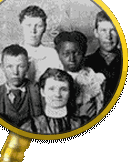1. Make sheets of paper in class using recycled paper. Tear strips of newspaper, soak them in water, and pulp them using a blender to make a slurry mixture. 2. Investigate modern papermaking methods that use wood pulp as the main component of paper, and compare and contrast these methods with colonial ones. 3. Create a timeline documenting the history of papermaking throughout the world. 4. Investigate different uses of paper throughout history.
Colonial Pennsylvania Plantation
Ridley Creek State Park Media, Pennsylvania 19063 610-566-1725
This site, located near Philadelphia in Delaware County, offers students a glimpse at colonial plantation life. Many educational opportunities are available, a number of which offer students hands-on opportunities to do the chores and crafts of colonial days: from drawing water, to candle-making, to carding and spinning wool. The website provides a link to an educational field trip brochure that provides descriptions on available programs and tours.
Historic Rittenhouse Town
206 Lincoln Drive Philadelphia PA 19144-4903 215-438-5711
The original site of William Rittenhouse's paper mill along the Wissahickon Creek is known today as Historic RittenhouseTown. None of the paper mills remain (the third and final one on the site was torn down in the late nineteenth century) but several of the houses used by the Rittenhouse family, including their 1707 house, have been restored. Several of the buildings are open for tours. Educational tours are available, including interactive hand papermaking and colonial German cooking. Contact the Director of Education by phone at (215) 843-2228 or email at education@rittenhousetown.org to receive more information, to check on the availability of a date, or to schedule a program.
International Paper Company
Lock Haven Mill PO Box 268 Lock Haven, PA 17745 717-748-1246 fax: (717) 748-1244
This mill offers tours for students aged 10 and above. While this mill makes paper exclusively from wood pulp, the experience would be valuable as a comparison and contrast to colonial paper making methods. To schedule a tour contact Julie Brennan.




